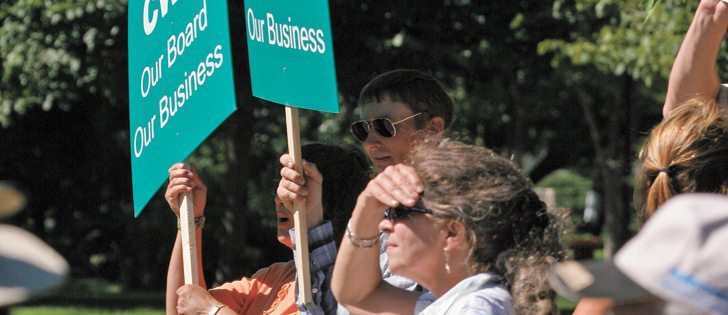Like it or loathe it, the Western Canadian Wheat Growers Association is clear about its mission.
As noted on its website, the association is “a voluntary farm advocacy organization” that focuses on “policy solutions” for farmers.
In contrast, the role of commodity groups is more opaque. Canola, wheat, barley and pulse commissions use most of their check-off revenue to support research, market development and communications, but public policy is also part of the mix.
Stephen Vandervalk, vice-president of the wheat growers association, is concerned that commissions are spending too much time on what should be a minor part of their mandate: policy and lobbying. He said commissions, because of their structure, cannot effectively represent the interests of levy payers.
Read Also

Agritechnica Day 3: Hybrid drive for a combine, data standards keep up to tech change and tractors of the year
Agritechnica 2025 Day 3: Hybrid drive for a combine, data standards keep up to tech change and tractors of the year.
“When you’re a commission and taking checkoffs from everybody, that means you have every type of opinion (within the organization). Trying to lobby against something is really tough because you’re looking at 25 percent of people would agree with you, 25 percent would disagree and the other 50 percent probably don’t care,” said Vandervalk.
“Commissions in general, especially since the demise of the (Canadian) Wheat Board, have sort of stuck their nose a little bit into policy more than they used to…. I’m not so sure I agree with that.”
The wheat growers association is a voluntary organization funded by memberships, which commissions are funded through mandatory checkoffs on grain sold with the option of a refund.
“That completely makes the difference,” Vandervalk said.
“We’re not a commission… we don’t have a mandatory checkoff. That means we’re able to speak on behalf of our members.”
Brian Otto, former president of the Western Barley Growers Association and chair of the Barley Council of Canada, disagreed.
He said voluntary checkoffs mean producers who disagree with a commission’s policy or lobbying efforts can ask for their money back.
“(Or) come to the annual meeting and voice your opinion, whether they (the elected board) are working effectively on your behalf or not,” he said.
Otto said it’s unrealistic for commodity groups to ignore policy because issues will arise that force organizations to take a stance. As well, a group such as Alberta Barley works with the Western Barley Growers Association, Sask Barley and the Barley Council of Canada on broad industry objectives, and public policy will naturally be part of those discussions.
“We have to work co-operatively,” he said. “Trying to gnaw off distinct lines between organizations, to me, is divisive.”
Lynn Jacobson, president of the Alberta Federation of Agriculture, isn’t so sure commissions and commodity groups should be spend time on public policy issues.
As an example, many Alberta commissions are fighting the provincial government on Bill 6, the controversial farm labour and workplace safety legislation.
“In some ways, they’re overstepping their role as a commission to do that,” Jacobson said.
“We’re having a bit of trouble in Alberta defining what a GFO (general farm organization) does and what a commission does.”
Many Alberta farmers may support the Bill 6 battle, but what will happen if commission leaders begin taking stances on issues such as wetland policy and greenhouse gas emissions?
Those positions may alienate one segment of check-off payers, Vandervalk said.
“Even in Alberta, even though I agree with the (Alberta Wheat Commission) on most things, I say, ‘listen guys, you can’t do that.’ You’re going to end up in a battle and you’re going to get in trouble. Then you try and go the other way on another issue, to make up for it, then you get in trouble again,” Vandervalk said.
“We’re not trying to keep them (commissions) out of our wheelhouse, (but) I think in the long run, (commissions) are not going to be able to keep people happy. You can’t have people asking for their check-off dollars back.”
Contact robert.arnason@producer.com
















